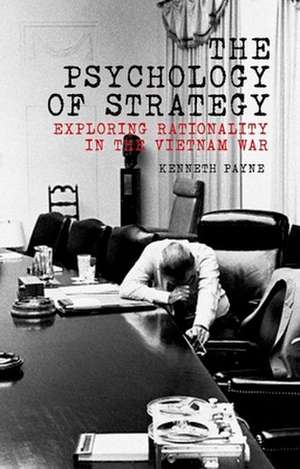The Psychology of Strategy
Autor Kenneth Payneen Limba Engleză Hardback
The Nixon and Johnson administrations both proved susceptible to the processes that are familiar to students of modern neuroscience and psychology, but perhaps less appreciated within strategic studies. US strategists in the Vietnam era miscalculated in ways that would surprise rational theorists, but not evolutionary psychologists: they exaggerated the stakes, embraced risky and overly optimistic solutions, and failed to appreciate the limits of force to shatter the enemy's resolve. Their concern for reputation led to escalation, based on a flawed conception of what such escalation could achieve.
The Vietnam conflict provides an excellent illustration that war is an inherently psychological phenomenon. This challenges abstract notions of rationality in strategic affairs, suggesting that the strategists -- much like the rest of us -- are strangers to themselves.
Preț: 470.47 lei
Preț vechi: 580.83 lei
-19% Nou
Puncte Express: 706
Preț estimativ în valută:
90.04€ • 93.01$ • 74.93£
90.04€ • 93.01$ • 74.93£
Carte disponibilă
Livrare economică 04-18 martie
Preluare comenzi: 021 569.72.76
Specificații
ISBN-13: 9780190227234
ISBN-10: 0190227230
Pagini: 256
Dimensiuni: 142 x 218 x 23 mm
Greutate: 0.43 kg
Editura: Oxford University Press
ISBN-10: 0190227230
Pagini: 256
Dimensiuni: 142 x 218 x 23 mm
Greutate: 0.43 kg
Editura: Oxford University Press
Notă biografică
Kenneth Payne is a political psychologist and lecturer in Defence Studies at King's College London. He is also a research associate at the Centre for International Studies, Oxford University.
